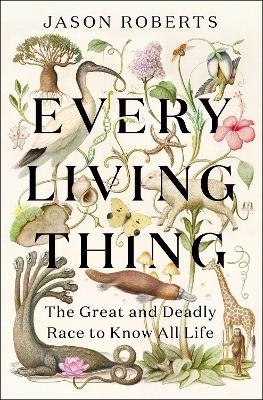
Every Living Thing
The Great and Deadly Race to Know All Life
Seiten
2025
Riverrun (Verlag)
978-1-5294-0048-9 (ISBN)
Riverrun (Verlag)
978-1-5294-0048-9 (ISBN)
- Noch nicht erschienen (ca. April 2025)
- Versandkostenfrei innerhalb Deutschlands
- Auch auf Rechnung
- Verfügbarkeit in der Filiale vor Ort prüfen
- Artikel merken
A thrilling account of a centuries-old rivalry - an exploration of scientific discovery and its evolution in an ever-changing and displaced world.
The dramatic, globe-spanning and meticulously-researched story of two scientific rivals and their race to survey all life.
In the 18th century, two men dedicated their lives to the same daunting task: identifying and describing all life on Earth. Their approaches could not have been more different. Carl Linnaeus, a pious Swedish doctor with a huckster's flair, believed that life belonged in tidy, static categories. Georges-Louis de Buffon, an aristocratic polymath and keeper of France's royal garden, viewed life as a dynamic, ever-changing swirl of complexities. Both began believing their work to be difficult, but not impossible--how could the planet possibly hold more than a few thousand species? Stunned by life's diversity, both fell far short of their goal. But in the process they articulated starkly divergent views on nature, on humanity's role in shaping the fate of our planet, and on humanity itself.
The rivalry between these two unique, driven individuals created reverberations that still echo today. Linnaeus, with the help of acolyte explorers he called "apostles" (only half of whom returned alive), gave the world such concepts as mammal, primate and homo sapiens--but he also denied species change and promulgated racist pseudo-science. Buffon coined the term reproduction, formulated early prototypes of evolution and genetics, and argued passionately against prejudice. It was a clash that, during their lifetimes, Buffon seemed to be winning. But their posthumous fates would take a very different turn.
With elegant, propulsive prose grounded in more than a decade of research, bestselling author Jason Roberts tells an unforgettable true-life tale of intertwined lives and enduring legacies, tracing an arc of insight and discovery that extends across three centuries into the present day.
The dramatic, globe-spanning and meticulously-researched story of two scientific rivals and their race to survey all life.
In the 18th century, two men dedicated their lives to the same daunting task: identifying and describing all life on Earth. Their approaches could not have been more different. Carl Linnaeus, a pious Swedish doctor with a huckster's flair, believed that life belonged in tidy, static categories. Georges-Louis de Buffon, an aristocratic polymath and keeper of France's royal garden, viewed life as a dynamic, ever-changing swirl of complexities. Both began believing their work to be difficult, but not impossible--how could the planet possibly hold more than a few thousand species? Stunned by life's diversity, both fell far short of their goal. But in the process they articulated starkly divergent views on nature, on humanity's role in shaping the fate of our planet, and on humanity itself.
The rivalry between these two unique, driven individuals created reverberations that still echo today. Linnaeus, with the help of acolyte explorers he called "apostles" (only half of whom returned alive), gave the world such concepts as mammal, primate and homo sapiens--but he also denied species change and promulgated racist pseudo-science. Buffon coined the term reproduction, formulated early prototypes of evolution and genetics, and argued passionately against prejudice. It was a clash that, during their lifetimes, Buffon seemed to be winning. But their posthumous fates would take a very different turn.
With elegant, propulsive prose grounded in more than a decade of research, bestselling author Jason Roberts tells an unforgettable true-life tale of intertwined lives and enduring legacies, tracing an arc of insight and discovery that extends across three centuries into the present day.
Jason Roberts is the author of the national bestseller A Sense of the World, which was a finalist for the National Book Critics Circle Award, longlisted for the Guardian First Book Award, and named a best book of the year by the Washington Post, San Francisco Chronicle, Kirkus Reviews, and School Library Journal. The winner of the Van Zorn Prize for fiction (founded and awarded by Michael Chabon), he is a contributor to McSweeney's, The Believer, The Rumpus, and other publications, as well as editor of the bestselling 642 Things to Write About series. He lives in the San Francisco Bay Area.
| Erscheint lt. Verlag | 10.4.2025 |
|---|---|
| Verlagsort | London |
| Sprache | englisch |
| Maße | 129 x 198 mm |
| Gewicht | 41 g |
| Themenwelt | Naturwissenschaften ► Biologie ► Botanik |
| Naturwissenschaften ► Biologie ► Evolution | |
| ISBN-10 | 1-5294-0048-1 / 1529400481 |
| ISBN-13 | 978-1-5294-0048-9 / 9781529400489 |
| Zustand | Neuware |
| Informationen gemäß Produktsicherheitsverordnung (GPSR) | |
| Haben Sie eine Frage zum Produkt? |
Mehr entdecken
aus dem Bereich
aus dem Bereich
Gefäßpflanzen: Grundband
Buch | Hardcover (2021)
Springer Spektrum (Verlag)
44,99 €
Diversität, Morphologie, Ökologie und Evolution der Pilze
Buch | Softcover (2023)
Springer (Verlag)
49,99 €
ein Baum erzählt seine erstaunliche Geschichte
Buch | Hardcover (2024)
Ludwig (Verlag)
23,00 €


